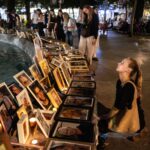Kenya’s President William Ruto praised King Charles courage for addressing ‘uncomfortable truths’
King Charles III has sparked massive reactions with his acknowledgement of the “abhorrent and unjustifiable acts of violence committed against Kenyans” during their independence struggle.
The 74-year-old monarch has finally broken his silence on the issue amid growing calls of apology, telling a state banquet in Nairobi of his “greatest sorrow and regret” and that there was “no excuse” for the atrocities.
In his historic speech during his state visit to Kenya, the King admitted the “wrongdoings” of Britain’s colonial era.
In response to Charles’ shock admission about colonial violence, Kenya’s President William Ruto praised the King’s courage for addressing such “uncomfortable truths”.
He told the King that colonial rule had been “brutal and atrocious to African people” and that “much remains to be done in order to achieve full reparations”.
Ahead of the King’s state visit to Kenya, the first to a Commonwealth country since the start of his reign, there had been speculation about a symbolic royal apology. However, the King did not deliver a formal apology, which would have to be decided by government ministers.
The King, reportedly have to speak on the advice of ministers and UK Prime Minister Rishi Sunak has already rejected calls for an apology on the separate issue of slavery.
But if the King stopped short of an apology, his speech in Kenya’s State House was a significant and strongly-worded recognition of the wrongs committed under colonialism.
As Kenya marks its 60th anniversary of independence, the King told his audience: “It matters greatly to me that I should deepen my own understanding of these wrongs, and that I meet some of those whose lives and communities were so grievously affected.”
Some royal fans and other charity bosses also admired the King for his reaction to the humanitarian crisis in the country. There are memories of the suppression of the Mau Mau uprising in Kenya, where thousands were killed and tortured in the 1950s before independence.
Previously, UK government voiced its “regrets that these abuses took place” and announced payments of almost £20m to more than 5,000 people, in what it called a “process of reconciliation”.
On the other hand, the lack of an apology on this trip might have disappointed some Kenyans like David Ngasura of the Kenyan Talai clan. He has already written letters to the royal family seeking an apology and reparations – and in response Buckingham Palace referred his request to the Foreign, Commonwealth and Development Office
















